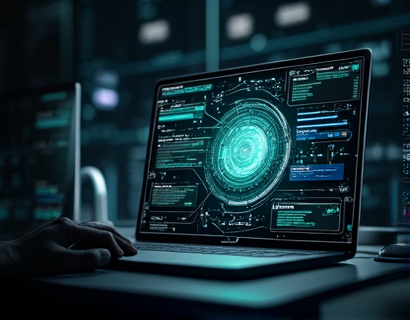Unlocking Next-Gen Productivity and App Accessibility Through AI and Crypto Fusion
The integration of Artificial Intelligence (AI) and cryptocurrency is ushering in a new era of digital innovation, one that promises to revolutionize how we interact with technology and manage our daily tasks. This fusion of technologies is not just about enhancing existing systems but about creating entirely new paradigms for productivity and accessibility. For tech enthusiasts and early adopters, this convergence opens up a world of possibilities, offering tools that are smarter, more secure, and more user-friendly than ever before.
The core of this transformation lies in the unique capabilities of AI and the inherent advantages of cryptocurrency. AI brings intelligence, adaptability, and automation to digital solutions, enabling systems to learn from data, recognize patterns, and make decisions with minimal human intervention. On the other hand, cryptocurrency provides a decentralized, secure, and transparent method for transactions and data storage, reducing reliance on centralized authorities and enhancing user control over personal data.
Enhancing Productivity with AI-Powered Tools
One of the most immediate impacts of AI in the digital space is the enhancement of productivity tools. Traditional task management applications are being reimagined with AI at their core, offering smarter scheduling, automated reminders, and predictive analytics to optimize workflows. These AI-driven tools can analyze user behavior and preferences to suggest the most efficient ways to complete tasks, effectively acting as personal digital assistants.
For instance, AI can predict the best times for meetings based on participants' schedules and availability, automatically suggesting optimal times to minimize disruptions. It can also prioritize tasks based on urgency and importance, ensuring that critical activities are addressed first. This level of automation not only saves time but also reduces the cognitive load on users, allowing them to focus on higher-value tasks that require human creativity and decision-making.
Decentralized App Accessibility Through Cryptocurrency
Cryptocurrency plays a pivotal role in making these AI-powered tools more accessible and secure. By leveraging blockchain technology, applications can offer decentralized access, eliminating the need for centralized servers and reducing the risk of data breaches. Users gain greater control over their data, as it is stored across a network of nodes rather than in a single, vulnerable location.
Moreover, cryptocurrency transactions within these applications are secure and transparent, ensuring that all interactions are verifiable and tamper-proof. This is particularly beneficial for users who value privacy and security, as it provides a level of trust that is often lacking in traditional centralized systems. The use of smart contracts further automates and enforces agreements, reducing the need for intermediaries and speeding up processes.
Innovative Digital Solutions for Everyday Tasks
The combination of AI and cryptocurrency is not limited to productivity tools; it extends to a wide range of applications that simplify everyday tasks. For example, AI-driven financial management platforms can analyze spending patterns and provide personalized budgeting advice, all while using cryptocurrency for secure and transparent transactions. These platforms can automatically convert currencies, invest in decentralized finance (DeFi) products, and manage assets, all with minimal human intervention.
In the realm of healthcare, AI-powered diagnostic tools can analyze medical data to identify potential health issues early, suggesting preventive measures and treatment plans. These tools can integrate with wearable devices and health apps, providing real-time monitoring and alerts. Cryptocurrency can facilitate secure and private sharing of health data between patients and healthcare providers, ensuring compliance with data protection regulations while enhancing the quality of care.
Smart Contracts and Decentralized Applications
Smart contracts, a key feature of blockchain technology, are revolutionizing the way agreements are executed and managed. In the context of AI and cryptocurrency, smart contracts can automate complex workflows, ensuring that all parties adhere to the terms of an agreement without the need for intermediaries. This is particularly useful in business processes, supply chain management, and even voting systems, where transparency and trust are paramount.
Decentralized applications (dApps) built on blockchain platforms can leverage AI to offer dynamic and adaptive user experiences. These dApps can learn from user interactions, improving their functionality over time. For instance, a decentralized marketplace can use AI to match buyers and sellers based on preferences and past transactions, while ensuring that all transactions are secure and transparent.
Enhancing User Experience Through AI and Crypto
The user experience is significantly enhanced when AI and cryptocurrency are combined. AI can personalize interfaces and functionalities based on user behavior and preferences, creating a more intuitive and user-friendly environment. For example, a decentralized social media platform can use AI to curate content that aligns with a user's interests, while ensuring that data is stored securely on the blockchain.
Cryptocurrency enables seamless and fast transactions within these platforms, reducing the friction often associated with traditional payment methods. Users can easily purchase, sell, or exchange digital assets without the need for intermediaries, making the entire process more efficient and cost-effective. This is particularly beneficial for global users, as cryptocurrency transactions are not bound by geographical boundaries or traditional banking hours.
Challenges and Considerations
While the potential of AI and cryptocurrency is vast, there are challenges that need to be addressed to fully realize their benefits. One of the primary concerns is the regulatory landscape, as both AI and cryptocurrency are still evolving fields with varying levels of acceptance and regulation across different regions. Developers and businesses must navigate these regulations carefully to ensure compliance and avoid legal pitfalls.
Another challenge is the technical complexity involved in integrating AI and cryptocurrency. Developing robust and secure systems requires expertise in both domains, which can be a barrier for smaller organizations. However, as the ecosystem grows, more tools and frameworks will become available, making it easier for developers to create innovative solutions.
Future Prospects
The future of AI and cryptocurrency is bright, with numerous opportunities for growth and innovation. As technology advances, we can expect to see more sophisticated AI models that can handle even more complex tasks, from creative content generation to advanced data analysis. Cryptocurrency, on the other hand, is likely to become more mainstream, with increased adoption in various industries and everyday transactions.
The convergence of these technologies will continue to drive the development of decentralized and intelligent systems, offering users unprecedented levels of control, security, and efficiency. For tech enthusiasts and early adopters, this is an exciting time to be part of a community that is shaping the future of digital solutions.
In conclusion, the fusion of AI and cryptocurrency is not just a technological trend but a fundamental shift in how we approach digital productivity and app accessibility. By leveraging the strengths of both fields, we can create a more intelligent, secure, and user-centric digital world, where the possibilities are truly limitless.










































